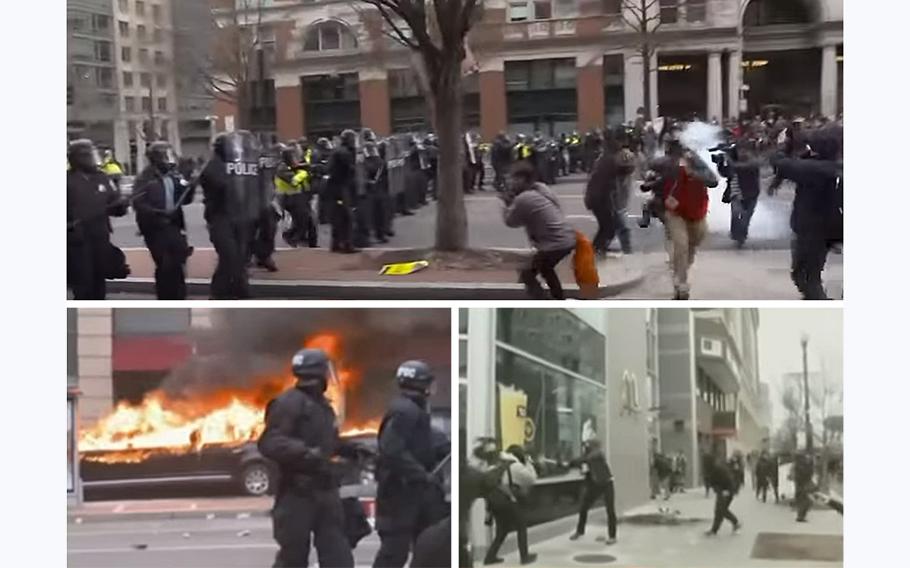
Video screen grabs show violent crowds being confronted by police as protesters rampaged through Washington D.C. on Jan. 20, 2017, just blocks from where then-President Donald Trump was inaugurated. (YouTube)
Americans surveyed shortly before last year's midterm elections overwhelmingly saw political violence as a problem facing the country and generally opposed violent acts against either everyday people or elected officials. Still, a significant percentage deemed political violence - which the survey defined as "violence, threats, intimidation or harassment" - acceptable in certain scenarios, according to a new study of the survey data.
The study's authors noted that the percentage of people who found political violence acceptable shifted somewhat based on the circumstances and targets described in the survey questions, and concluded that "increased context and level of specificity about the type of violent acts are likely to reduce support for violence" reflected in polling. They added that leaders and elected officials, "in addition to thinking carefully about political violence" when addressing the public, "should be specific in describing the context for and type of political violence committed."
In the survey, by the polling firm YouGov along with States United Action, a nonpartisan group that promotes fair elections, 78 percent of Americans saw politically motivated violence as a problem in the United States, with 12 percent seeing it as "not much of a problem" or "no problem at all." Additionally, between 73 and 78 percent said they would "never" support activities "like killing, injuring, harassing, or doxxing ordinary people with whom they disagree politically."
But in its analysis of the data, States United Action also found that some Americans expressed more receptive views of political violence depending on the specificity of the question. For example, 43 of Americans said that if the government banned possession of all firearms, political violence was at least sometimes acceptable, including 18 percent who said such a scenario meant violence was "always" acceptable. Or if the government banned all abortions with no exceptions, 34 percent said political violence was acceptable at least some of the time, including 8 percent who said an unconditional abortion ban "always" justified violence.
When people were asked squarely about their support for violence if their preferred presidential candidate lost the 2024 election "after all eligible votes were counted fairly," 20 percent said violence may be at least "a little" justified. But when asked whether violence was justified if their preferred political candidate lost "because of unfair actions" from political rivals, support for at least some violence rose to 37 percent.
And 30 percent said political violence was "always" or "frequently" acceptable if "leaders from the party in power disobey the laws while prosecuting their political opponents who disobey the same laws." That percentage rose to 49 when including those who said violence was "occasionally" acceptable under such circumstances.
The researchers did not survey partisan affiliation because, they say, such research can further inflame support for political violence.
"This research is nonpartisan, and one of its lessons is that the way we talk about political violence shapes people's attitudes," said Thania Sanchez, senior vice president of research at States United Action. "Our goal is to analyze the reality of political violence in the U.S. today without further polarizing the discourse or contributing to support for violence."
The survey of 3,049 U.S. adults taken between Oct. 27 and Nov. 3 of last year directly asked respondents if it was ever okay for their political allies to commit certain violent acts against ordinary political opponents. Those theoretical cases included killing someone, beating up someone or throwing rocks at a person, destroying property, visibly protesting with firearms outside someone's home, harassing or intimidating someone in person or online to make them afraid, or publishing someone's personal information. In each case, while an overwhelming majority said it was never acceptable to commit such acts against any person, the survey also found notably greater support for violent acts against elected officials of the opposite party compared with support for violence against everyday Americans.
Threats of political violence, harassment and intimidation have moved to the center of American political life in the wake of the attack on the U.S. Capitol on Jan. 6, 2021, by supporters of former president Donald Trump. High-profile violent attacks, protests and fears of riots have also concerned experts, elected officials and most Americans heading into the 2024 presidential election cycle.
Trump, who was recently criminally charged by the Justice Department over his handling of classified documents, has vilified the legal system while supporters have alluded to potential violence in response to that indictment and an earlier one in Manhattan on hush-money charges. This has led to fears concerning protests and violent online rhetoric.
While the United States has experienced periods of political violence before - with notable instances of threats, harassment and intimidation against voters, election workers, elected officials and judges during the last two election cycles - the study's authors caution that polling on the matter runs the risk of overstating Americans' support for political violence, pointing out how the polling questions' language and context can elicit varying responses.